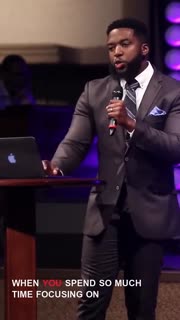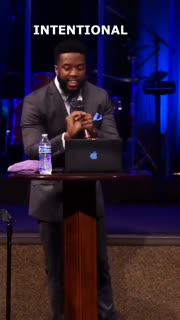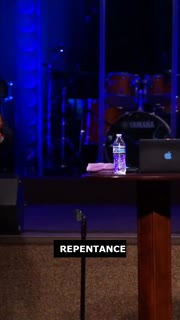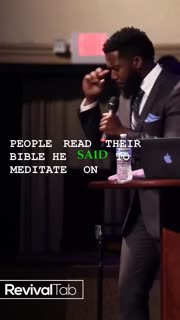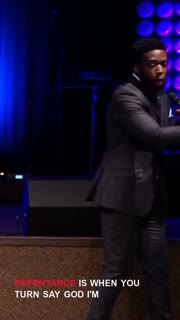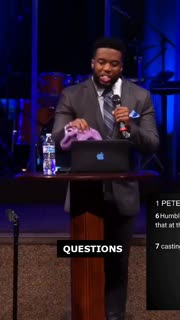Busting Myths: Understanding God's Word and Repentance
Devotional
Sermon Summary
Bible Study Guide
Sermon Clips
### Quotes for Outreach
1. "We are talking about the King of Kings and the Lord of Lords. We are talking about the one who sits high and looks low and loves you in spite of who you are, in spite of everything you did. Y'all a little quiet on this side. I'm talking about the true and living God, the one that loves everything about who you are as you are at this very moment." [30:34] (20 seconds)
2. "When you spend so much time focusing on the one tree that you can't consume, you lose appreciation for the tens of thousands of trees that you can consume. You lose appreciation for the majority because you can't help but focus on the one thing that God said not to do." [41:14] (20 seconds)
3. "It takes intentional efforts to grow a healthy relationship with God. Amen. The relationship is healthiest not just when you don't consume. The relationship is actually healthiest when you learn what to do after you've consumed." [44:27] (17 seconds)
4. "Repentance is not just necessary but it's a beautiful thing when you understand it. See Paul says in Romans chapter 6 that we are no longer slaves to sin. He goes on to say that we are slaves to whatever we choose to obey. Whatever you obey you're consumed by and whatever you're consumed by controls you." [48:50] (25 seconds)
5. "If you are filled first with the word of God, if you are filled first with knowing what you are grounded in, if you are filled first with knowing the things that God told you to do, battling temptation will be a lot easier because you will look at the wrong thing and say I'm not worried about you." [01:05:23] (20 seconds)
### Quotes for Members
1. "When you are consumed by what you're supposed to have, you lose focus and interest for the things that you aren't supposed to have. There was a research group that interviewed and surveyed a group of pastors and leaders of the local church... They reported on average this was just on average they said during a 30-minute sermon 10 of those minutes people are scrolling on social media." [42:51] (60 seconds)
2. "Blame always leads to defiance, ownership leads to repentance. Blame leads to defiance, ownership leads to repentance. Look at Judges 6 and 7. Judges 6 and 7 verses 14 to 15... Gideon is petitioning you skipped about 45 people and you came to me I have no reason to believe." [49:47] (60 seconds)
3. "Repentance is when you turn say God I'm sorry I'm going to go this direction now God I'm sorry I know that what I did was wrong but I want to seek your face more than I want to seek those problems I know that what I did was wrong I know that what I did you didn't approve of but I don't want to feel disconnected from you anymore so help me to take steps in the direction that leads me straight to you." [52:18] (28 seconds)
4. "If you're wondering why it's so hard for you to live right maybe you're standing too close to that one thing that keeps tempting you. You keep acting like it's God's fault you keep acting like it's the devil's fault it's you it's me the devil didn't do that God didn't do that either that's your ego thinking that in your own strength you can fight this and you can't." [58:37] (26 seconds)
5. "Questions lead to clarity, assumptions lead to confusion. Questions lead to clarity, assumptions lead to confusion. You know the only thing missing from Adam and Eve's story in Genesis 3 they didn't ask God questions which lead to confusion left them confused." [01:12:01] (26 seconds)
Ask a question about this sermon
1. "We are talking about the King of Kings and the Lord of Lords. We are talking about the one who sits high and looks low and loves you in spite of who you are, in spite of everything you did. Y'all a little quiet on this side. I'm talking about the true and living God, the one that loves everything about who you are as you are at this very moment." [30:34] (20 seconds)
2. "When you spend so much time focusing on the one tree that you can't consume, you lose appreciation for the tens of thousands of trees that you can consume. You lose appreciation for the majority because you can't help but focus on the one thing that God said not to do." [41:14] (20 seconds)
3. "It takes intentional efforts to grow a healthy relationship with God. Amen. The relationship is healthiest not just when you don't consume. The relationship is actually healthiest when you learn what to do after you've consumed." [44:27] (17 seconds)
4. "Repentance is not just necessary but it's a beautiful thing when you understand it. See Paul says in Romans chapter 6 that we are no longer slaves to sin. He goes on to say that we are slaves to whatever we choose to obey. Whatever you obey you're consumed by and whatever you're consumed by controls you." [48:50] (25 seconds)
5. "If you are filled first with the word of God, if you are filled first with knowing what you are grounded in, if you are filled first with knowing the things that God told you to do, battling temptation will be a lot easier because you will look at the wrong thing and say I'm not worried about you." [01:05:23] (20 seconds)
### Quotes for Members
1. "When you are consumed by what you're supposed to have, you lose focus and interest for the things that you aren't supposed to have. There was a research group that interviewed and surveyed a group of pastors and leaders of the local church... They reported on average this was just on average they said during a 30-minute sermon 10 of those minutes people are scrolling on social media." [42:51] (60 seconds)
2. "Blame always leads to defiance, ownership leads to repentance. Blame leads to defiance, ownership leads to repentance. Look at Judges 6 and 7. Judges 6 and 7 verses 14 to 15... Gideon is petitioning you skipped about 45 people and you came to me I have no reason to believe." [49:47] (60 seconds)
3. "Repentance is when you turn say God I'm sorry I'm going to go this direction now God I'm sorry I know that what I did was wrong but I want to seek your face more than I want to seek those problems I know that what I did was wrong I know that what I did you didn't approve of but I don't want to feel disconnected from you anymore so help me to take steps in the direction that leads me straight to you." [52:18] (28 seconds)
4. "If you're wondering why it's so hard for you to live right maybe you're standing too close to that one thing that keeps tempting you. You keep acting like it's God's fault you keep acting like it's the devil's fault it's you it's me the devil didn't do that God didn't do that either that's your ego thinking that in your own strength you can fight this and you can't." [58:37] (26 seconds)
5. "Questions lead to clarity, assumptions lead to confusion. Questions lead to clarity, assumptions lead to confusion. You know the only thing missing from Adam and Eve's story in Genesis 3 they didn't ask God questions which lead to confusion left them confused." [01:12:01] (26 seconds)

